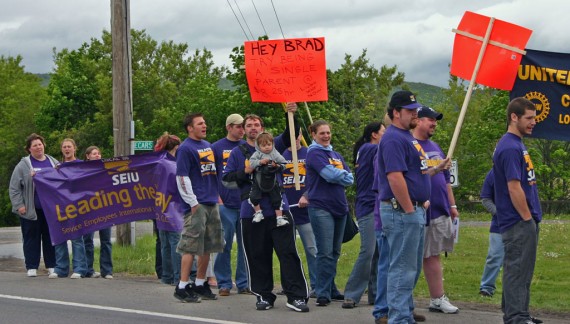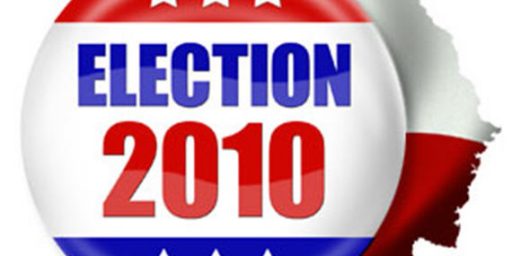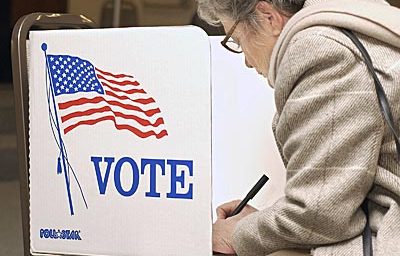Organized Labor And White House Trade Barbs In Wake Of Arkansas Runoff
In the wake of Blanche Lincoln’s win on Tuesday over union-backed Bill Halter in the Arkansas runoff, there have been signs of tension between the White House and the labor unions that backed Halter’s run from the left. It started, with a comment that Ben Smith shared late Tuesday night on his blog:
A senior White House official just called me with a very pointed message for the administration’s sometime allies in organized labor, who invested heavily in beating Blanche Lincoln, Obama’s candidate, in Arkansas.
“Organized labor just flushed $10 million of their members’ money down the toilet on a pointless exercise,” the official said. “If even half that total had been well-targeted and applied in key House races across this country, that could have made a real difference in November.”
That prompted a response from the AFL-CIO:
“If that’s their take on this, then they severely misread how the electorate feels and how we’re running our political program. When we say we’re only going to support elected officials who support our issues,” said AFL-CIO spokesman Eddie Vale. “When they say we should have targeted our money among some key house races among Blue Dog Democrats — that ain’t happening.”
“Labor isn’t an arm of the Democratic Party,” Vale said. “It exists to support working families. And that’s what we said tonight, and that’s what we’re gong to keep saying.”
And, well, it has sort of gone down hill from there:
While the three unions that spearheaded the anti-Lincoln push — AFL-CIO, American Federation of State, County and Municipal Employees and the Service Employees International Union — were disappointed by Halter’s loss, they remain upbeat about the declaration of independence they delivered to the White House and to Democrats who don’t support their agenda.
“We worked like hell to get the Senate and we worked like hell to get the White House, and our people are saying, ‘What the hell are we getting out of this?'” said Gerald McEntee, president of AFSCME, which shelled out $3 million to back Halter in Arkansas.
“We lost an election on Tuesday, but we laid down a marker,” he added. “We made the good fight, and we also made the point that we are not going to be boxed in by anybody.”
None of the three major unions that backed Halter are likely to support or endorse Lincoln in her tough general election matchup against Rep. John Boozman (R-Ark.), according to officials. The conservative Lincoln infuriated progressives by opposing the pro-union Employee Free Choice Act and the public option on health care, while supporting free trade agreements and Bush-era tax cuts.
“We’ll see if Blanche Lincoln is made a better senator for having to answer to working Arkansans over these past few weeks,” said SEIU National Political Director Jon Youngdahl, who promised to mount challenges to anti-health reform Democrats in the House, including Larry Kissell (D-N.C.), Zack Space (D-Ohio) and Mike McMahon (D-N.Y.).
“The labor movement is going to be at the side of those voters who demand change.”
And yet if the results of the Arkansas runoff indicate anything, they indicate that support for the union agenda is nowhere near what its proponents thought that it was. You can say the same thing about the failed efforts of SEIU to put candidates on the ballot in North Carolina to challenge Democratic Congressmen who voted against health care reform earlier this year. Clearly, there isn’t support for the radicalism that they unions support, and the Obama White House’s was right to say that it’s better, for the party, to support a Democratic incumbent rather than waste time and money on a primary challenge that will only serve to tear apart the party.
Republicans engage in the same kind of stupid behavior, of course. We’ve seen plenty of examples of the right wing of the party backing candidates who can’t possibly win in a General Election, or refusing to back a candidate who quite obviously can.
There’s something to be said for ideological purity, but it seems like a pointless position to take if it costs you power.






Doug, I think the key here is your last half a sentence: “… a pointless position to take if it costs you power.” I’ve worked in labor until very recently and from that perspective, Employee Free Choice was pretty much the be all, end all legislation that unions like AFSCME and SEIU have been focused on for at least the last 3 years. When it became clear that this was not likely to happen, focus changed drastic improvements in the costs of healthcare (the reasoning being that EFCA would have let them get better contracts by helping increase union density and cheaper healthcare would let union members get better contracts since by not having to use resources on holding the line on healthcare they could use them to push for wages).
In the end, neither of these things happened. Since getting NAFTA with Clinton’s election, union members have been warier of supporting Dems. I think this is a case of unions deciding that they already don’t have power. As long as they won’t take sides in primaries, Democrats will take them for granted. From the perspective of most rank and file union members – backing Halter and the like is not pointless as currently there is no power to lose.